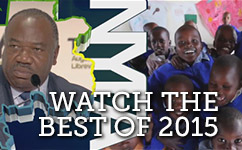NYFA 2015: INVEST IN THE ENERGY CONTINENT
Africa, considered by many as a major frontier market of the last decade, is increasingly attracting the attention of investors: many regimes have been shown to be stable and with increasing levels of governance and transparency, with healthy economic growth. Through this influx of FDI, partnered with ambitious infrastructure and major projects underwritten by governments and sovereign wealth funds, there has been a new injection of energy into the continent, a new sense of hope and expectation. The New York Forum AFRICA will examine the key areas of growth, and the investment opportunities that lie therein. Key to the dynamics of African development to date are that in the continent, power is expensive but the costs of its human resources are low – the opposite to the rest of the world. Is shifting this dynamic at the heart of Africa’s future?
Rather than concentrating on oil, gas and natural resources, the NYFA 2015 will focus on the energy of that comes from Africa’s human resources as well: its women and young people, and the energy provided by innovation and technology in the continent, research and development, and sectors like agriculture and natural resources.
The energy of African economies
30 African countries expect 5 – 17.5 percent growth in 2015
In its October 2014 report, the World Bank projected robust African GDP growth in the coming years, in contrast to weak global growth. This growth is attributed to improvements in political stability, an influx of investors drawn to the possibility of high returns, and increasingly peaceful, stable regimes. Across the region, there has been substantial investment in infrastructure, including in ports, electricity capacity, and transportation.
Several countries have also seen a strong recovery in the agriculture sector in 2014 and expect it to continue in 2015. The expansion of the services sector led by transport, telecommunications, financial services and tourism is also spearheading overall economic growth in a number of countries.
The energy from sector opportunities
Significant deepwater gas fields discovered off the coast of Tanzania, and discovered oil reserves in Mozambique, Kenya and Uganda have attracted international oil companies as partners, but also led to an increase in domestic benefits thanks to localisation programs and diversification of the national economies. Growing demand for electricity and falling costs for alternatives such as solar and wind mean more renewable energy projects have been commissioned in sub-Saharan Africa in 2014 than the previous 13 years put together. Investment in countries including South Africa, Kenya and Ethiopia is estimated at $5.9 billion in 2014 and may reach $7.7 billion in 2016 (compared with an average of $1 billion a year from 2006 to 2011). Meanwhile, the wealth of the African continent lies in its land, with two-thirds of Sub-Saharan Africa’s population relying on land activities such as agriculture, freshwater fishery and forestry for their livelihoods. An increasingly dry and hot climate will make Sub-Saharan Africa more prone to drought and its land less suitable for agriculture, with ever-shorter growing seasons and lower yields – and shrinking revenue.
What opportunities are provided by more efficient use of land, water, soil nutrients and increase yield without bringing about further climate change?
The energy of African innovation
The other huge natural resource in Africa is its capacity for innovation, which continues to generate new products, ideas, services and revenues that place African inventors at the forefront of emerging technology. With need as the mother of all invention, how can Africa continue to grow in areas of healthcare, energy, mobile communications and finance innovation – and how can governments and the private sector fast-track this growth?
The energy of African entrepreneurship
Africa is flush with opportunity and ideas; a consumer boom has been matched by increased inward investment and infrastructure development, and its educated and ambitious young population has responded. Africa’s entrepreneurial spirit is the envy of much of the western world, with businesses of every size and type opening up every day. Entrepreneurship is increasing in the continent alongside the booming economies and a new-found dynamism is emerging. Sub-Saharan Africa is the region with the highest number of people involved in early-stage entrepreneurial activity, with Zambia and Nigeria topping the world rankings. What steps need to be taken to ensure people starting their own businesses have the best possible chance of success?
The energy of African youth
Ambitious, self-starting, inventive, opinionated
The New York Forum AFRICA will play host to the second African Citizens’ Summit, in association with Train My Generation. Bridging the gap between young, educated Africans and the job market is a key challenge, and requires collaboration between government, education providers and the private sector. This year’s African Citizens’ Summit will focus on Job Creation and Enterprise and will ask the question: from where will the next generation of jobs in Africa come? You can read the results of the 2014 Train My Generation survey on http://bit.ly/1pWvDpI. This year, the African Citizens’ Summit will be held on the plenary stage of the Forum to reflect the importance of the continent’s youth in its economic development. These special sessions will be designed in collaboration with young people based on the results of the Train My Generation survey, which was launched by the NYFA 2014.
The energy of African consumers
Africa’s population, the fastest growing and youngest in the world, is concentrated in urban areas (with urban Africa predicted to provide 40 percent of GDP growth). This new class of consumer has a smaller family, is better educated and higher earning, and is digitally savvy. Africans are exceptionally optimistic about their economic future: 84 percent say they will be better off in two years, according to a McKinsey report. These new African consumers resemble their urban counterparts anywhere in the world: but they live in a continent of 53 countries and 2,000 dialects.
The energy of African women
Africa also leads the world in the number of women starting businesses, with almost equal numbers of male and female entrepreneurs, with women outnumbering men in Ghana, Nigeria and Zambia (and they make up the majority of small farmers). Yet barriers exist that push women traders and producers into the informal economy, where a lack of access to finance, information and networks stunt their capacity to grow their business and their contribution to the economy.
MARKETPLACE AND VILLAGE OF INNOVATION
The Marketplace, traditionally the gathering point of the NYFA where meetings are booked with participants and exhibitors from private and public sector, will be extended in 2015 to feature a Village of Innovation, building on the success of our inaugural Money Talks session at NYFA 2014, where one inventor secured investment live on stage. A carefully curated selection of African start-ups, each with an invention that has the power to bring about significant change, will be invited to showcase their work to participants in the Marketplace.





